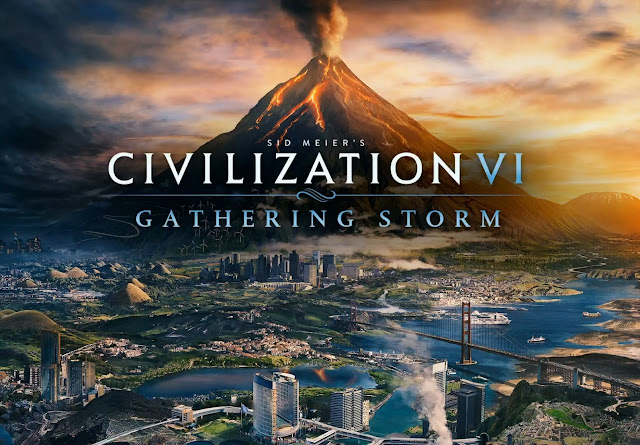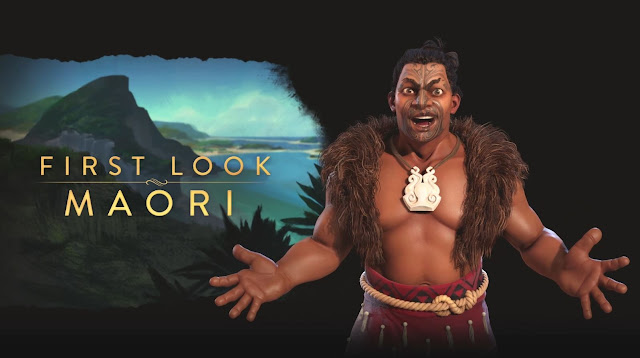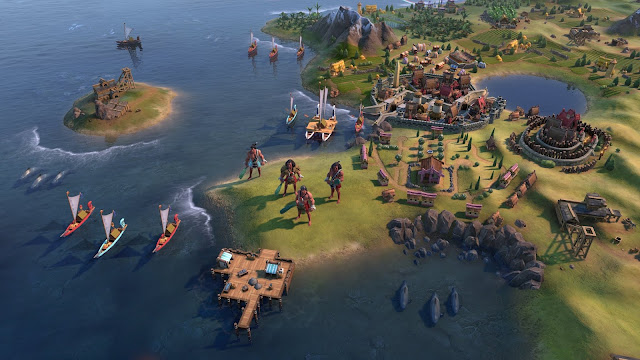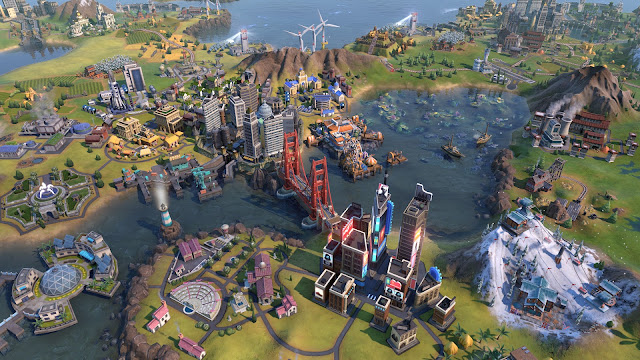Interview by Matt S.
I don’t think I’ve ever been this excited for an expansion to a game before, but the news that, among a host of other features, the upcoming Civilization VI: Gathering Storm expansion will include the native people of New Zealand – the Māori – as one of a number of new playable civilisations has me genuinely excited. It is very, very rare for New Zealand, its culture and nation to be depicted in games at all. It’s even less common for the indigenous people of New Zealand to get some time in the sun.
“One thing that we have been trying to figure out how to introduce to Civilization VI is a return to some kind of Polynesian representation in the civilisation line-up,” Dennis Shirk, the senior producer of the game at 2K Games, said. “We had added Polynesia in Civilization V, and it was a popular nation with our fans, but what we had done was mix and match from different cultures within Polynesia. We had a leader from Hawaii, the Easter Island Moai statues, and then a Maori warrior all glued together to form the Polynesian civilisation.
“The more we evolved the series, the more we’ve been wanting to dive deeper, and focusing on separate nations. Years ago we would lump all native American tribes into a single civilisation, but we wouldn’t do that now. Now we like to pick just one from the area, and really understand their history, to try to represent their belief system, and highlight the importance of their culture is in as sensitive and as respectful way as we possibly can.
There are plenty of options when it comes to Polynesian nations and people with rich histories and cultures. There’s the Samoan people, or the native Hawaiian culture, the Tongan and Fijian people, and many more besides. The development team ended up deciding on representing the Māori within the game because the cultural ideology of the Māori – of being good guardians for nature – fitted well with the environmental theme of the Gathering Storm expansion, and that the Māori leader, Kupe, was a legend that not only deserved to be told in the context of the other national leaders represented in Civilization VI, but his story also lent itself to some fascinating gameplay mechanics.
Kupe is credited with bringing the Māori people to New Zealand and finding them a home. What is fascinating about his legend is the ocean voyage that led him to the new land is very much the focus – the uncertainty of whether they’d be able to find a new home at all, and the risks inherent with such a voyage. Much of Kupe’s story is legend, of course, and it’s hard to tell fact from fiction with these kinds of stories, but the legend did allow the Civilization VI developers a very unique quirk; the Māori start their game on a boat, in the ocean, with no idea where land might be.
In Civilization, each nation typically starts out on solid land, with a “settler” unit, and in a patch of land that is fertile enough to immediately convert their settler into a city, which can then be used to build soldiers, explorers, and buildings. At the same time, that city starts to generate “science” and “culture” points, which lead to discoveries and improve the civilisation further.
So the Māori people, starting out on a boat and with no hope of settling land for at least the first half dozen or so turns, is off to an initial disadvantage. According to Shirk, the team didn’t want to punish players for picking the Māori, so the team found other ways to balance them out, so that players could simply enjoy that initial voyage for what it was intended to be; a thrilling adventure into the unknown. There was no need to rush, else face being instantly swamped by an established civilisation.
“When the Māori do settle their first city they get a free builder, they get an extra point of population, and they have more amenities than anyone else. They also are allowed to accumulate some science and culture before they settle their first city,” Shirk said.
“We’ve been testing them on and off over the last six months because we knew the design was very, very different. It’s the most unique civilisation we have had in terms of how it starts and how it plays because we wanted to reflect their origins, and their natural guardianship. They have a leader agenda that’s based on the Māori word kaitiakitanga, which means ‘guardianship’ itself.
“They actually want to try to progress with the game without chopping down any trees or damage the rainforest for them. We don’t take that option away from players completely, but we give them incentives to leave nature as it is. The Māori get extra production resources from having ‘unimproved’ rainforest, for example.
“We actually ended up making them too strong for a while,” Shirk laughed, “and we had to spend a bit of time toning them down, because our QA group kept coming back to tell us that it didn’t matter if players are slogging around in the beginning because these guys are just great once they get going and they really get on a roll.”
Staying respectful to culture
Some cultures are more straightforward to represent within a game like Civilization than others. There’s plenty of information out there about the history, culture, and sensitivities of the English, the Americans, the Japanese, Chinese, and Australians, for example. But in looking at a culture like the Māori, which was in genuine danger of losing even their language at one point, research becomes all the more important in order to ensure the in-game representation of the culture is appropriate, respectful, and accurate.
“Our international team obviously had a lot of research questions going into the project,” Ed Beach, franchise lead designer for the game at 2K Games said. “They reached out to a lot of their contacts in New Zealand, who provided us with a list of experts across various fields that we could consult with, especially for things like the facial tattoos, architecture, different buildings or what monuments would be used – basically, everything that would be visibly present in the game.
“We also partnered with the head of a school in New Zealand, the Māori New Zealand Arts & Crafts Institute. He helped us out in designing the tattoo that you’ll see on Kupe in your interactions with him. That’s not just something that you can make up because it has a lot of meaning to the Māori people, and the tattoo that’s put the face tells a story. It’s very personal to each person. Having that research available to us, to have those people available to us to make sure we were doing this right was extremely valuable.”
2K Games also takes a great deal of pride in the way it works with organisations who specialise in going around the world, finding language experts, and bringing back dead or rare languages to represent them accurately within the game, for when the various leaders speak. In the case of the Māori, the developer wanted to get the accent and intonation correct, and something that would get the tick of approval from the experts.
On building an expansion around environmentalism
In Civilization VI, each leader has their own agenda, and as long as you play your own civilisation in a way that meets their objectives based on that agenda, they’ll be your best friend. If, however, you refuse to respect their cultural aspirations, or compete with them in their key agendas, then you’ll find yourself at war with that civilisation sooner, rather than later.
In this way, where once in earlier versions of Civilization some civilisations were inherently more aggressive than others, in Civilization VI, all civilisations are both potentially friendly, and potentially aggressive. With Kupe and the Māori, if you’re chopping down trees and adding too many carbon emissions into the environment you’re going to end up facing down his military.
“If you haven’t thought about building national parks, if you haven’t planted any new trees, these are things that are going to displease Kupe,” Shirk said. “We have a new system in Gathering Storm where we actually keep track of how much carbon CO2 you’ve emitted into the air and Kupe looks at that as well.”
Environmentalism and climate change are the great challenges of the modern era, and Gathering Storm includes things such as the potential for the polar ice caps to melt, and the need to build sea walls to protect coastal cities from rising sea levels. Given that Civilization VI prides itself on authentically representing the way that cultures behave in each respective era of human history, it does seem a little strange that it would wait until now for the game to address the very real discussion that dominates global political and social discourse.
“If you look at the way most of our games roll out, the initial release is based on what cool, new mechanic. In Civilization IV to Civ V we introduced taxes. With Civilization VI we introduced the idea of districts in your city and a lot more city building,” Shirk said.
“With that foundation in place what we then do with our expansions is move through history and introduce systems specific to certain points in history. Usually, that first expansion touches the first half of the game (ancient through to the middle periods of history), and the second expansion touches the second half of the game (through to today). We felt like it was the right time for to introduce climate change, rising sea levels and so on for the first time.
“If you look at climate change in our own world, it’s something we haven’t resolved, and something we’re going to need to address over the next 50 years. As a result, we’ve had to push the timeline that Civilization VI runs to out as well. Now we have a new era at the end of the game that features additional techs and civics, and now it finishes closer to 2050. And because of the fact that it’s harder to get to the victory conditions, so we’ve re-balanced those, and what we’ve found is that you’re going to really rely on coal and oil for a period of time, but at a point, you’re going to badly need to switch over to renewables.”
There are five different renewable resources available, but it takes a while (and a likely period of heavy carbon emission) to get there. Does that mean that the expansion has a fatalistic theme that it won’t allow players a hypothetical opportunity to guide the world through history that never involved excessive pollution and climate change?
“Actually, I’m trying it within a game I’m playing right now with the Māori,” Shirk said. “I’m trying to win the game without emitting any carbons for the entire game, which is a new challenge I’ve put on myself just to see if it’s possible. I think, just because I got a really good jump start towards a culture victory early in this game, that I might be able to pull it off, but it’s definitely a challenge.
“We’ve made changes to the way strategic resources work, so even bringing an ironclad or a submarine on-line, those things are going to be consuming oil or coal in return just to move them around the map. So I can’t even have a very modern army right now. I’m hoping I made enough friends that I’m not going to get into a big war at the end of this game, so I’m not sure I’ll get there in the end, but it’s certainly an interesting challenge.”
Civilization VI: Gathering Storm is due for release on PC on February 14, 2019. At this stage there’s no release planned for the recently-released Nintendo Switch version of Civilization VI, but we have our fingers crossed!
– Matt S.
Editor-in-Chief
Find me on Twitter: @digitallydownld
Please help keep DDNet running: Running an online publication isn’t cheap, and it’s highly time consuming. Please help me keep the site running and providing interviews, reviews, and features like this by supporting me on Patreon. Even $1/ month would be a hugely appreciated vote of confidence in the kind of work we’re doing. Please click here to be taken to my Patreon, and thank you for reading and your support!











